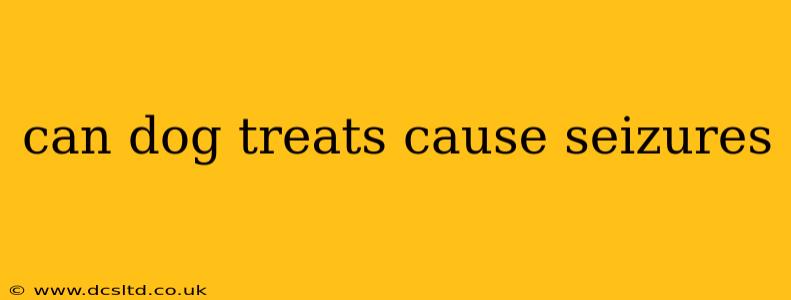Can Dog Treats Cause Seizures? A Comprehensive Look at Potential Triggers
The short answer is: yes, certain dog treats can potentially trigger seizures in susceptible dogs. However, it's crucial to understand that this isn't a common occurrence, and many factors contribute to canine seizures. Let's delve deeper into the potential culprits, contributing factors, and what you can do to protect your furry friend.
What Ingredients in Dog Treats Might Cause Seizures?
Several ingredients found in commercially produced and even homemade dog treats can potentially trigger seizures in dogs prone to them. These include:
-
Xylitol: This artificial sweetener is extremely toxic to dogs, even in small amounts. Ingestion can lead to a rapid drop in blood sugar, potentially causing seizures, liver failure, and even death. Always check the ingredient list carefully; xylitol is a significant concern.
-
Excessive Caffeine or Theobromine: While small amounts of chocolate (containing theobromine) might not severely affect all dogs, large quantities can be toxic and lead to seizures. Caffeine, similarly, is a stimulant that can be problematic for sensitive dogs.
-
Artificial Sweeteners (Other than Xylitol): While not as drastically toxic as xylitol, other artificial sweeteners can still disrupt a dog's system and might contribute to seizures in predisposed animals.
-
Certain Preservatives: Some preservatives used in commercial dog treats have been linked to potential health issues, although direct causation to seizures is often less clearly established.
-
Mold or Mycotoxins: Contaminated treats, whether homemade or commercial, can contain mycotoxins, which are poisonous substances produced by molds. These can have a range of negative effects on a dog's health, including neurological issues like seizures.
What Other Factors Contribute to Seizures in Dogs?
It's essential to remember that dog treats are rarely the sole cause of a seizure. Many other factors contribute to canine epilepsy and seizures, including:
- Underlying Medical Conditions: Many diseases, such as kidney disease, liver disease, or brain tumors, can cause seizures.
- Genetics: Certain breeds are predisposed to epilepsy.
- Head Trauma: Injuries to the head can result in seizures.
- Infections: Brain infections can trigger seizures.
- Exposure to Toxins: Beyond ingredients in treats, various other toxins can induce seizures.
Can Certain Dog Treats Exacerbate Existing Epilepsy?
For dogs already diagnosed with epilepsy, even treats generally considered safe can potentially trigger a seizure if given in large quantities or at inappropriate times. It's crucial to follow your veterinarian's advice regarding your dog's diet and medication regimen, including treat intake.
How Can I Prevent Dog Treats from Triggering Seizures?
- Read Labels Meticulously: Always check the ingredient list for potentially harmful substances like xylitol.
- Choose High-Quality Treats: Opt for treats from reputable brands with transparent ingredient sourcing.
- Monitor Your Dog After Giving Treats: Observe your dog for any unusual behavior following treat consumption.
- Consult Your Veterinarian: Discuss any concerns about your dog's diet, especially if they have a history of seizures. They can advise on suitable treats and identify potential dietary triggers.
- Make Your Own Treats: If you're concerned about commercial treats, consider making your own using simple, safe ingredients. Consult with your vet for recipes and guidance.
My Dog Had a Seizure After Eating a Treat; What Should I Do?
If your dog experiences a seizure after consuming a dog treat, seek immediate veterinary attention. This is crucial for diagnosis, treatment, and to rule out underlying medical conditions. Note the brand and ingredients of the treat if possible, as this information can be helpful to your vet.
Disclaimer: This information is for general knowledge and does not constitute veterinary advice. Always consult your veterinarian for any concerns regarding your dog's health and diet.
